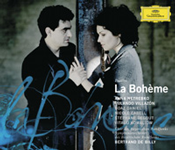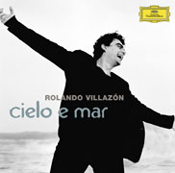Recently in Recordings
The Sixteen continues its exploration of Henry Purcell’s Welcome Songs for Charles II. As with Robert King’s pioneering Purcell series begun over thirty years ago for Hyperion, Harry Christophers is recording two Welcome Songs per disc.
In February this year, Albanian soprano Ermonela Jaho made a highly lauded debut recital at Wigmore Hall - a concert which both celebrated Opera Rara’s 50th anniversary and honoured the career of the Italian soprano Rosina Storchio (1872-1945), the star of verismo who created the title roles in Leoncavallo’s La bohème and Zazà, Mascagni’s Lodoletta and Puccini’s Madama Butterfly.
Collapsology. Or, perhaps we should use the French word ‘Collapsologie’ because this is a transdisciplinary idea pretty much advocated by a series of French theorists - and apparently, mostly French theorists. It in essence focuses on the imminent collapse of modern society and all its layers - a series of escalating crises on a global scale: environmental, economic, geopolitical, governmental; the list is extensive.
Amongst an avalanche of new Mahler recordings appearing at the moment (Das Lied von der Erde seems to be the most favoured, with three) this 1991 Mahler Second from the 2nd Kassel MahlerFest is one of the more interesting releases.
If there is one myth, it seems believed by some people today, that probably needs shattering it is that post-war recordings or performances of Wagner operas were always of exceptional quality. This 1949 Hamburg Tristan und Isolde is one of those recordings - though quite who is to blame for its many problems takes quite some unearthing.
The voices of six women composers are celebrated by baritone Jeremy Huw Williams and soprano Yunah Lee on this characteristically ambitious and valuable release by Lontano Records Ltd (Lorelt).
As Paul Spicer, conductor of the Royal Birmingham Conservatoire Chamber Choir, observes, the worship of the Blessed Virgin Mary is as ‘old as Christianity itself’, and programmes devoted to settings of texts which venerate the Virgin Mary are commonplace.
Ethel Smyth’s last large-scale work, written in 1930 by the then 72-year-old composer who was increasingly afflicted and depressed by her worsening deafness, was The Prison – a ‘symphony’ for soprano and bass-baritone soloists, chorus and orchestra.
‘Hamilton Harty is Irish to the core, but he is not a musical nationalist.’
‘After silence, that which comes closest to expressing the inexpressible is music.’ Aldous Huxley’s words have inspired VOCES8’s new disc, After Silence, a ‘double album in four chapters’ which marks the ensemble’s 15th anniversary.
A song-cycle is a narrative, a journey, not necessarily literal or linear, but one which carries performer and listener through time and across an emotional terrain. Through complement and contrast, poetry and music crystallise diverse sentiments and somehow cohere variability into an aesthetic unity.
One of the nicest things about being lucky enough to enjoy opera, music and theatre, week in week out, in London’s fringe theatres, music conservatoires, and international concert halls and opera houses, is the opportunity to encounter striking performances by young talented musicians and then watch with pleasure as they fulfil those sparks of promise.
“It’s forbidden, and where’s the art in that?”
Dublin-born John F. Larchet (1884-1967) might well be described as the father of post-Independence Irish music, given the immense influenced that he had upon Irish musical life during the first half of the 20th century - as a composer, musician, administrator and teacher.
The English Civil War is raging. The daughter of a Puritan aristocrat has fallen in love with the son of a Royalist supporter of the House of Stuart. Will love triumph over political expediency and religious dogma?
Beethoven Symphony no 9 (the Choral Symphony) in D minor, Op. 125, and the Choral Fantasy in C minor, Op. 80 with soloist Kristian Bezuidenhout, Pablo Heras-Casado conducting the Freiburger Barockorchester, new from Harmonia Mundi.
A Louise Brooks look-a-like, in bobbed black wig and floor-sweeping leather trench-coat, cheeks purple-rouged and eyes shadowed in black, Barbara Hannigan issues taut gestures which elicit fire-cracker punch from the Mahler Chamber Orchestra.
‘Signor Piatti in a fantasia on themes from Beatrice di Tenda had also his triumph. Difficulties, declared to be insuperable, were vanquished by him with consummate skill and precision. He certainly is amazing, his tone magnificent, and his style excellent. His resources appear to be inexhaustible; and altogether for variety, it is the greatest specimen of violoncello playing that has been heard in this country.’
Baritone Roderick Williams seems to have been a pretty constant ‘companion’, on my laptop screen and through my stereo speakers, during the past few ‘lock-down’ months.
Melodramas can be a difficult genre for composers. Before Richard Strauss’s Enoch Arden the concept of the melodrama was its compact size – Weber’s Wolf’s Glen scene in Der Freischütz, Georg Benda’s Ariadne auf Naxos and Medea or even Leonore’s grave scene in Beethoven’s Fidelio.
Recordings

20 Jul 2008
Villazón on Deutsche Grammophon
The opera world, always ravenous for talented, charismatic tenors, felt desperate hunger pains last summer, when Rolando Villazón canceled dates with an explanation that a health crisis necessitated a sabbatical from singing.
Only recently he returned to the opera stage, earning cautiously positive notices at Covent Garden in the title role of Verdi's Don Carlos.
One signpost of his career's advancement before the crisis had been his signing with Deutsche Grammophon, often considered (rightly or wrongly) the premiere label for classical artists. So it was in March of 2007 that the tenor recorded the Italian recital disc, Cielo e Mar, and participated in live performances of La Bohème with Anna Netrebko in Munich the following month, which DG recorded.
 The recital disc covers a wide range of 19th century Italian opera composers, including the Brazilian-born Antônio Carlos Gomes. The pieces reflect Villazón's questing intelligence, with the more well-known arias, such as the title "Cielo e mar," and two arias from Saverio Mercadante, as well as one from the afore-mentioned Gomes. Giuseppe Pietri's romanza from Maristella may not seem like a known item, but its warm melody struck your reviewer's ears as familiar. Some may claim to hear evidence of the tenor's coming crisis, but where exactly? The studio recording captures the tenor's instrument in strong, handsome form. The occasional resemblance to Domingo remains (including some tightness of high notes), yet Villazón's personality shines through - warmer, more romantic than Domingo's pained heroism. Daniele Callegari supports the singer well, with the increasingly busy Orchestra Sinfonica di Milano Giuseppe Verdi.
The recital disc covers a wide range of 19th century Italian opera composers, including the Brazilian-born Antônio Carlos Gomes. The pieces reflect Villazón's questing intelligence, with the more well-known arias, such as the title "Cielo e mar," and two arias from Saverio Mercadante, as well as one from the afore-mentioned Gomes. Giuseppe Pietri's romanza from Maristella may not seem like a known item, but its warm melody struck your reviewer's ears as familiar. Some may claim to hear evidence of the tenor's coming crisis, but where exactly? The studio recording captures the tenor's instrument in strong, handsome form. The occasional resemblance to Domingo remains (including some tightness of high notes), yet Villazón's personality shines through - warmer, more romantic than Domingo's pained heroism. Daniele Callegari supports the singer well, with the increasingly busy Orchestra Sinfonica di Milano Giuseppe Verdi.
The live recording of Bohème does find Villazon's instrument a tad raspy, and the tightness a bit more worrying on the highest notes. It was a NYCO television broadcast of the tenor as Rodolfo that first brought him renown in the USA, and he still has the youthful, poetic soul for the role. Arguably the true star of this performance, however, is Anna Netrebko's Mimi. From start to finish, she is in fine form, full-bodied, sensitive, unapologetically gorgeous. Despite the fullness of her delivery, she still manages to characterize Mimi's growing fragility. DG assembled a cast of younger singers of note for the other Bohemians; the refreshingly smaller-scaled Musetta of Nicole Cabell, paired with Boaz Daniel as Marcello, alongside Stéphane Degout and Vitalij Kowaljow, doing excellent work as Schaunard and Colline.
Conducting the Bayerischen Rundfunk forces, Bertrand de Billy enforces some odd pauses, perhaps to facilitate aspects of the live performance. Whether to accommodate the singers or simply his own interpretation, he pushes the tempo a bit at times, possibly to effect greater excitement, then slows down to highlight the drama. It's not an erratic performance, and certainly the musicians play well. A listen to Beecham on his classic set might make some listeners wish for the same confidence from de Billy in Puccini's music.
The booklet note claims that this CD will also serve as a soundtrack to a film version. Your reviewer has no other information, but the photo stills in the booklet, if from such a film, suggest a very handsome production.
Many an opera fan may feel that his/her collection has enough sets of the Puccini classic. The recital disc contains enough that is rare, and is of such high quality overall, that any fan of fine tenor singing needs to give it a listen. As well as to wish Mr. Villazón continued good health.
Chris Mullins

